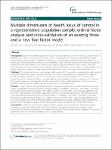Multiple dimensions of health locus of control in a representative population sample: ordinal factor analysis and cross-validation of an existing three and a new four factor model
Otto, Christiane
Bischof, Gallus
Rumpf, Hans-Jürgen
Meyer, Christian
Hapke, Ulfert
John, Ulrich
Background: Based on the general approach of locus of control, health locus of control (HLOC) concerns controlbeliefs due to illness, sickness and health. HLOC research results provide an improved understanding of health related behaviour and patients’ compliance in medical care. HLOC research distinguishes between beliefs due to Internality, Externality powerful Others (POs) and Externality Chance. However, evidences for differentiating the POs dimension were found. Previous factor analyses used selected and predominantly clinical samples, while nonclinical studies are rare. The present study is the first analysis of the HLOC structure based on a large representative general population sample providing important information for non-clinical research and public health care. Methods: The standardised German questionnaire which assesses HLOC was used in a representative adult general population sample for a region in Northern Germany (N = 4,075). Data analyses used ordinal factor analyses in LISREL and Mplus. Alternative theory-driven models with one to four latent variables were compared using confirmatory factor analysis. Fit indices, chi-square difference tests, residuals and factor loadings were considered for model comparison. Exploratory factor analysis was used for further model development. Results were crossvalidated splitting the total sample randomly and using the cross-validation index. Results: A model with four latent variables (Internality, Formal Help, Informal Help and Chance) best represented the HLOC construct (three-dimensional model: normed chi-square = 9.55; RMSEA = 0.066; CFI = 0.931; SRMR = 0.075; fourdimensional model: normed chi-square = 8.65; RMSEA = 0.062; CFI = 0.940; SRMR = 0.071; chi-square difference test: p < 0.001). After excluding one item, the superiority of the four- over the three-dimensional HLOC construct became very obvious (three-dimensional model: normed chi-square = 7.74; RMSEA = 0.059; CFI = 0.950; SRMR = 0.079; fourdimensional model: normed chi-square = 5.75; RMSEA = 0.049; CFI = 0.965; SRMR = 0.065; chi-square difference test: p < 0.001). Results were confirmed by cross-validation. Results based on our large community sample indicated that western general populations separate health-related control-beliefs concerning formal and informal assistance. Conclusions: Future non-clinical HLOC studies in western cultures should consider four dimensions of HLOC: Internality, Formal Help, Informal Help and Chance. However, the standardised German instrument needs modification. Therefore, confirmation of our results may be useful. Future research should compare HLOC structure between clinical and non-clinical samples as well as cross-culturally.
No license information

